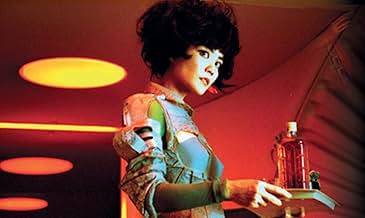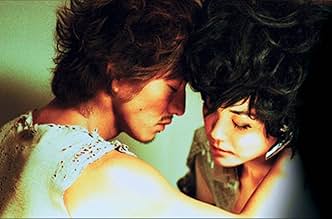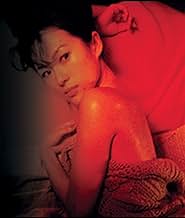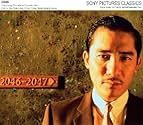Nachdem ein Science-Fiction-Autor die Frau verloren hat, von der er glaubt, sie sei die einzige wahre Liebe seines Lebens gewesen, treten andere Frauen im Laufe mehrerer Jahre in das Leben d... Alles lesenNachdem ein Science-Fiction-Autor die Frau verloren hat, von der er glaubt, sie sei die einzige wahre Liebe seines Lebens gewesen, treten andere Frauen im Laufe mehrerer Jahre in das Leben des Schriftstellers.Nachdem ein Science-Fiction-Autor die Frau verloren hat, von der er glaubt, sie sei die einzige wahre Liebe seines Lebens gewesen, treten andere Frauen im Laufe mehrerer Jahre in das Leben des Schriftstellers.
- Auszeichnungen
- 38 Gewinne & 81 Nominierungen insgesamt
- Chow Mo-wan
- (as Tony Leung)
- Wang Jie-wen
- (as Dong Jie)
- Bird
- (as Bird Thongchai McIntyre)
- Ah Ping
- (as Siu Ping-Lam)
- Party girl
- (as Sabrina Cheung)
- Dabao
- (as Ching Siu-Lung)
Empfohlene Bewertungen
This film is very beautifully made. It is atmospheric, with excellent cinematography and a very beautiful classical soundtrack. The story weaves from one relationship to another without getting confusing, even though they do not occur in chronological order. The emotions portrayed are rich and varied. I am particularly impressed by Ziyi Zhang's performance in the film as a woman who makes the transition from being strong willed and independent woman to being desperately in love. The plot is complex and will require many viewings to understand what it is about. There is a lot of imagery in the film, and many of them I have not been able to spot if I had not read the other comments here. This film is really a piece of art!
We learn from the narrator and lead character, Chow (Leung), that there is a place, if not a time, called 2046, where people don't leave unless they fall in love. But, for the bulk of the film, the film is not set in any kind of futuristic setting that might be assumed on the outset of going into the film. It's set in late 60's Hong Kong, where Chow writes lurid fantasy stories. He takes room 2046 after seeing a woman, Su (Li Gong), in the room. He feels that this place is where he, like others, can go to "lose memories" ("All memories are traces of tears", a title-card reads), which spurs him on the start writing a sci-fi novel with the room's title.
During his stay, he meets two women that effect him: an abused girl, at first acting aloof, Lulu/Mimi (Carina Lau), leaves and the later comes back in the film as a kind of writing assistant for Chow. The more significant woman, however, is in the form of call-girl Bai Ling (Zhang Ziyi, a woman so gorgeous it borders on the unreal), who like the others takes room 2047, and becomes Chow's "drinking buddy". But this soon turns to playfulness, to a side affair. Although there is much else that goes on in the film, this has some of the best material, with wonderful dialog and style giving room for perhaps th best performance I've seen from Ziyi yet.
This is not all to the film, though it could've been and been as successful. The women in Wong's films, like with Hitchcock or even Antonioni or Godard (all directors he was obviously inspired by for his own original stance), are crucial to how it turns out. These women express everything Wong desires, abandons, represses, flirts, and acts cool with. They spur on almost every one of his creative pieces (he gives a short story of 2047 to one, who wonders why the ending is so sad, to which he cannot create a happy one), and all of the things he'd rather not forget. Without the strong performances from them all, in particular Ziyi, Lau and Cheung, the drama just wouldn't be there, and certainly the style giving much weight to the film would become over-cooked and pretentious.
The style, of which, was something I took various notes of while I watched, scribbling bits, elements, colors and shots that caught my eyes: the greens in the halls, the brightness of outside on the porch, the black and white scene in the cab (one of my favorites), and of course the futuristic visualization scenes of Chow's own 2046. What's curious about the real sci-fi type scenes is that they make little sense aside from the central point- finding real love and the exile following- but the atmosphere, use of different colors and shots and film speeds (Christopher Doyle, a DP on most of Wong's films, does beautiful work all around) is unique, and basically saves a dramatically empty sequence.
There is also the question of slow-motion, which is used to much more effect than in the previous Wong films I've seen, and if it is over-used. It becomes a distraction only towards the end, when one wishes things were not TOO romanticized, but many times it is affecting, and tries to past the melodrama in some of the (above average) writing. Overall, Wong Kar-Wai displays without a shadow of doubt with 2046 that he is a master of compositions, of moods, and of creating characters that are true to themselves, who feel and love but can't seem to reach for it. But this doesn't make it an 'empty' film. If a scene missteps or something gets irksome with the style, it comes back around at the next minutes.
Wong Kar Kai is a filmmaker who calls for a personal empathy. He works to capture all the unique dynamics of romance, and how they bend our sense of time and space.
He turns his camera every which angle to try and find new vocabulary for telling a story. Well, he doesn't tell stories, he asks whether stories are found in relationships. We get pieces of stories on top of hidden stories, our focus shifts from "story" to emergent feelings out of the glimpses.
This is sophisticated, and scary when unprepared for the exotic nature. We want the familiar, but are given delicately meandering puzzles, opaque hints at beginnings, middles, and endings. Just like we don't always know at what point our own stories are unfolding. But we know the emotional states as they are lived.
Since 2046 lacks many standard cadences, it is a struggle to follow the statement through the movements. These are not even vignettes, these are a seamless series of leaps that push and pull like the emotions of day to day life. They have an indecisive flux we hope is asymptotically reaching a conclusion, but they just keep coalescing and spilling over into the imagined future from where no one has yet returned. Once we think we have moved beyond the past do we then realize that we create an unknown future by attempting to reconstruct the past in the present.
And so the main character is a writer of 'fiction' (this very movie) who through the process of embedding real life circumstances into his science fiction he also tries to determine if there is a destination this is all heading. 2046 is a place you visit to relive unchanging memories so that you will never change. Alternately, 2046 is also a time existent only within a science fiction novel when people will access substitute lovers without the haunts of what broke them in the past. So they think.
He has already been damaged by the loss of an impossible standard that cannot be met by another (see In the Mood for Love first!). So in his novel, lovers become characters. Feelings become fictional ornamentations in the future. In the present, he cannot connect with the women who come and go. In the fiction, the lack of connection is simply a matter of technological limitations.
Think about what happens in the aftermath of a failed relationship or a missed opportunity. We may grieve, but also sometimes we obsessively construct a future fantasy based on what should have happened if things had gone right; if only some vital detail didn't change things how it did. We inhabit that imagined future and interact with our counterpart ghost, making plans and times and places accordingly. We might use this process as a shield and a warning. Or it sabotages, taking on a life of its own as a mental blueprint, directing the actual present and perceptions of new companions.
Lush, poetic cinematography fills each second of this film to great mood inducing effects. In 1960's Hong Kong, where the bulk of the events take place, the dynamics of romantic encounters hide in unassuming corners of that society, only brought to light by looking at the normal world in very abnormal ways. One almost gets the impression that set pieces and abstract designations were literally dreamed up. The camera often cramps our frame of vision. Various off-center closeups which in a sense shut out the outside world, but paradoxically bring it all in to bear. There are many places where the camera does not seem to have a good shot of a character or an event, we the viewers were just unlucky to miss the opportunity of getting the full revelation of something.
And it frustrates; we want to know everything but get very little by way of visual exposition. We are forced to work on the clues, the voice overs, the symmetrical accidents in different centuries and different countries. This is not analogous to idly putting together a complex puzzle set, this is reconstructing a mystery while at the same time being on the verge of shedding tears at the quiet understanding that it isn't a mystery, it's life with a character who mediates between reality and fantasy to deal with it all. I know the kinds of things this film is about, but I've never looked at them from this stance before. As is often the case, the artist (here the writer/filmmaker) is just the one who experiences what the rest of us experience and talks about its secrets rather than conceals them.
See this film if you want to know how it's possible to visually show the invisible, inner turbulence and romantic visions that tend to hide from the outside world. On the whole, 2046 weaves in the present a future fiction invaded by the past, bred by the throes of confronting the human faces of opportunities that appear, disappear, reappear and fade and collapse into each other.
2046 was the same. Already released on DVD me and my girlfriend were quite interested in seeing it. Having already seen "In the Mood for Love" we were looking forward to something much the same, except hopefully a little faster in pace and emotionally-heated. I thought I was going to be the Hero renting a romance (which I don't normally go for) but it turned out to be a disappointment.
Perhaps it is not so much the fault of the movie, but of the trailers that lead you to believe that the movie is something that it isn't.
The movie is, like many other films from Kar Wai Wong, a visual masterpiece in my opinion. I was riveted to the images he is truly a modern painter. This is not to be underestimated. This is enough to get you through the whole movie, despite its crawling pace. Simply for the images I can understand that many viewers would love this movie.
But it takes more then that to make the "ultimate love movie" (as it was advertised here in Germany). I found many parts in the movie confusing and mixed up, I got the impression towards the end that the movie might not be in chronological order. If it isn't, then there is much more to investigate for me, if it is, then I have to say that the movie isn't that clear, and that the characters motives and feelings are not always properly portrayed.
If this was a book, I would love to read it. Simply to get into the heads of the characters and find out what they were thinking, what was driving them, and how they were feeling. Perhaps that is what is left out, perhaps that is why we find it so odd here in the West. We are used to romances being opened and voiced, and usually simple. We are not used to people feeling emotions but hiding their motives behind those emotions, which might be more understood in a conservative society such as China.
This is a movie I would love to own, and watch over and over again, just to try to understand if there is any magic hidden that cannot be seen at the first watching. I would not be surprised if that is how it is, but the long dragging scenes might hinder me from sitting though it more then 2 more times, because it drags. Perhaps next time Kar Wai Wong should hire a brutal editor and good writer to get his ideas out, because this movie had greater potential then what it became. Still, for me it gets 7/10 : its far from BAD.
Several years in the making and highly anticipated, _2046_ (2004) should pacify director Wong Kar Wai's fans, at least, for its end-of-an-era feel and look. At its core, this is a decidedly (or deceptively) simple movie, in spite of its fractured and non-linear narrative. It tells the tale of an emotionally wrecked man, Chow Mo Wan (played by Tony Leung), a reprised character from Wong's critically acclaimed earlier oeuver, _In the Mood for Love (2000)_, and the many beautiful women he keeps and fails to keep, in a time-space continuance that is laden with sepia-tinted memories: a monologue, if you will, of Chow's torrid love affairs, love spats, and the ensuing heartbreaks resulting, no doubt, from the pangs of a failed liaison Chow is trying to escape. It'd appear that the failed relation with Su Lizhen (Maggie Cheung) in _In the Mood for Love_, who has a "special appearance" in this film, has changed Chow irrevocably, which is key to understanding Chow's troubled soul.
But it is not a sequel necessarily, per se, to _In the Mood for Love_. This film can still be watched on its own, though it'd certainly help if you could link moments in _2046_ to the director's earlier works, for it's laden with jumbled continuity (take the character of Lulu, for example, first seen in _Days of Being Wild (1991)_), hidden meanings (read: Neo-Godardian) and other fun stuff, sorta an insider's joke, if you dig such esoteric things. But I digress. And it's been said that this is a culmination of all the previous filmic experience of director Wong (bordering on narcissism); hence its "end-of-an-era" feel and look is duly appreciated and a point well taken.
In _2046_, Chow's isn't an easily likable character owing to the frailty and the vagaries of his own personal emotions and peccadilloes, but that makes him only human and real, and his character, believable. Take the following exchange:
Su Lizhen (Gong Li) to Chow Mo Wan (Tony Leung): Do you know my past?
Professional gambler Su (she who is of the same name as that of Maggie's character in _In the Mood for Love_) asked Chow, dissonantly, questioning the latter essentially whether there is a future for the both of them, if he cannot forget his past. And it's for the same reason, or so we're led to believe, that Bai Ling (Zhang Ziyi) is left devastated, as Chow cannot treat her any differently from the scores of other women he's seeing; hence eliciting the following memorable line from Bai which I'm sure speaks to most of us one way or another:
Bai Ling (Zhang Ziyi) to Chow Mo Wan (Tony Leung): You may not like me. But I'll like you all the same.
What fools we are made by love. :)
Contrasting Chow as a man who dwells in the past and in need of closure to move on, Tak (Kimura Takuya) isn't ambiguous when it comes to matters of the heart.
Tak (Kimura Takuya) to Wang Jingwen (Faye Wong): I do not know what your answer may be. (I dread to know.) But I need to know.
Here is a man who is not afraid to love and says his love. And he needs to know if his love is unrequited. And in seeking happiness, the message seems to be that there is no other way. Now why does this remind me of all the sorry tales with which we are all-too-familiar with men-who-cannot-commit-or-decide? :) And so the film is thusly replete with impressions of repeated variations of the same theme: the pointlessness of returning to the past. Which is why we have the following line:
Bai Ling (Zhang Ziyi) to Chow Mo Wan (Tony Leung): Why can't it be like before? (The same reason why nobody returns on the 2046 train, in Chow's sci-fi novel of the same name. Seen in this light, it is also a double-entendre for director Wong: Why can't this film be like the one before in the form of _In the Mood for Love_? Where does he go from here?)
Those familiar with Wong's earlier works will notice his signatures throughout: quick cutting, slow motion, fast motion, freeze frames, black and white, tilt shots, color filters, neon-sign lighting, aided ably by three able cinematographers. Production value of _2046_ is expectedly top-notch. Music by Shigeru Umebayashi is haunting and sets the right mood. Zhang Suping (William Chang Suk Ping) does a wonderful job in creating an enrapturing atmosphere set in the late '60s.
How great it is, in an otherwise desolate world of unease, vulnerability, hopelessness, and pathos, we have directors such as Wong to feast our senses. Highly recommended.
Wusstest du schon
- WissenswertesEach character speaks their own languages. Mr. Chow speaks Cantonese, Bai Ling speaks Mandarin, and Tak speaks Japanese, even when talking to each other. Even so, they seem to understand each other perfectly.
- Zitate
Chow Mo Wan: Love is all a matter of timing. It's no good meeting the right person too soon or too late. If I'd lived in another time or place... my story might have had a very different ending.
- Alternative VersionenChinese version is edited for sexuality in the Ziyi Zhang/Tony Leung love scenes.
- VerbindungenFeatured in Belas Artes: A Esquina do Cinema (2012)
- Soundtracks2046 Main Theme
(Percussion)
Composed and Arranged by Shigeru Umebayashi
Licensed To Virgin, EMI
(p) & © Block 2 Music Company Ltd.
Top-Auswahl
Details
Box Office
- Budget
- 12.000.000 $ (geschätzt)
- Bruttoertrag in den USA und Kanada
- 1.444.588 $
- Eröffnungswochenende in den USA und in Kanada
- 113.074 $
- 7. Aug. 2005
- Weltweiter Bruttoertrag
- 20.207.146 $
- Laufzeit2 Stunden 9 Minuten
- Farbe
- Sound-Mix
- Seitenverhältnis
- 2.35 : 1
Zu dieser Seite beitragen



































